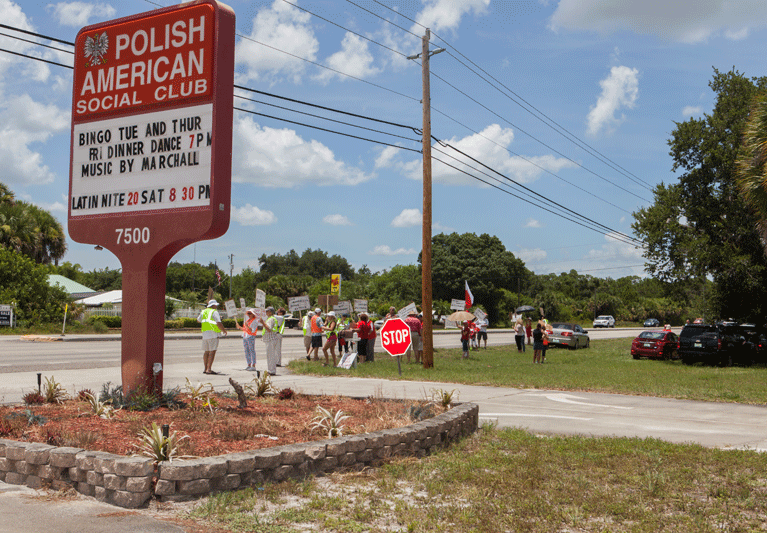
Members of the Polish-American Social Club lost another court battle Tuesday in an ongoing fight to regain control of an estimated $1.25 million in assets once set aside to promote the culture and heritage of the Eastern European nation.
But, that doesn’t mean the war over the property on U.S. 1 near 39th Avenue is over. Despite years of combat, no white flag of surrender is in sight
Factions remain split over the club Board of Directors’ 2015 decision to broaden its mission by dissolving the old club and forming a spinoff group, the Vero Beach Social Club, without the consent of its members.
Some say that’s just what was needed to keep attendance high, but others argue the move was done in bad faith to push out the Poles and their commitment to elevating their culture.
Judge Paul Kanarek denied the dissident members’ request to find the board’s disposition of assets and dissolution of the Polish-American Social Club unauthorized last week, saying their argument was legally insufficient. If approved, the move could have restored the original club and acknowledged its claim to the property.
“I think this is an issue the court could rule on as a matter of law,” the judge said to the crowded courtroom, denying the motion without prejudice, meaning the members can bring the issue up again. Contract disputes that aren’t deemed ambiguous can be decided by the court, he said.
Kanarek told the members’ attorneys to obtain more evidence. One affidavit isn’t sufficient to find the board’s actions void, he said. A signed statement of someone’s best knowledge and belief might not hold up on appeal the same way hardened facts do.
It was around September 2013 when disputes arose over the direction of the Polish-American Social Club of Vero Beach. Members calling themselves the ‘Old Guard’ wanted to keep Polish culture at the forefront of activities, while others felt expanding the mission would grow the club.
The situation got so tense by 2015 that the Board of Directors formed a new corporation, the Vero Beach Social Club. Without a vote by the membership, all of the Polish-American Social Club’s assets were transferred to the new nonprofit and the Polish-American Social Club of Vero Beach was dissolved.
Lawyers for the ‘Old Guard’ allege the board schemed to seize the property and dissolve the club in manner that was unfair. They say the board violated its own bylaws, statutory and fiduciary duties. The move, they claim, constituted civil conspiracy and unjust enrichment.
The group now wants the judge to restore the Polish-American Social Club’s standing, return the property and enter a judgment for damages.
No one is challenging that the board unilaterally transferred the property and dissolved the club, argued attorney Casey Walker for the dissident members in the Vero Beach courthouse. “There has been not even a hint of a whisper that there is a dispute over that,” he said.
Because there is no dispute over the facts, members are entitled to summary judgment, Walker continued. The Polish-American Social Club’s bylaws are clear the board’s work is “subject to the approval of the regular membership,” he said. This includes any expenditures over $500.
It would defy logic, reason and common sense to have bylaws that do not allow a board to spend more than $500 without the approval of its members, but allow that same board to “give away” all of the corporation’s real and personal property without a vote, Walker writes in his motion for summary judgment.
But, the situation is not that simple, countered attorneys for the board. The bylaws are not clear and therefore, a jury, not a judge, should determine fact. The question is not whether the property was transferred, and the original club dissolved; the question is whether those actions were permissible, argued lawyer Lynn Hampton on behalf of the governing body.
The bylaws also say business affairs are overseen by the board. “How far does each [rule] go?” she asked. “The bylaws are subject to multiple interpretations.”
Hampton said her clients sought legal counsel before transferring the assets and dissolving the Polish-American Social Club. They had the authority and duty to interpret the statues in a reasonable manner, which they did, she said. “It wasn’t an action taken lightly.”
The Polish-American Social Club of Vero beach was founded in 1981 by Polish-American citizens to promote Polish culture and customs along the Treasure Coast. Revenue from membership dues and social events like dances and dinners brought in around $92,000 in 2015, according to tax filings. That year, the nonprofit claimed over $500,000 in net assets.
But, membership was dropping. It went from some 750 participants in 2007 to just 325 by 2015. Between 2014 and 2015 alone, revenue fell nearly $40,000. One group trying to grow the club thought expanding cultural offerings would attract more members.
Overtime, polka dances turned into salsa night, and the perogies and potato pancakes were replaced by meat loaf and lasagna. A newsletter soon boasted, “You don’t have to be Polish to join this club.”
Polish members picketed the club, rules tightened and a turf war over the direction of the club and its property ensued. There were allegations of financial mismanagement and public arguments so tense that law-enforcement was routinely called.
Then, the ‘Old Guard’ took its argument to court. The members filed a civil complaint against the board in October 2015, Hampton writes in her objection to summary judgment. One month later an amended complaint was dismissed. In May 2016 a second amended complaint was drafted and the case was ordered to mediation, she said.
Board members anticipated a settlement this year, but by October, the ‘Old Guard’ demanded the case go back in front of judge.
Photo from July 2015 during protests – By: Denise Ritchie



